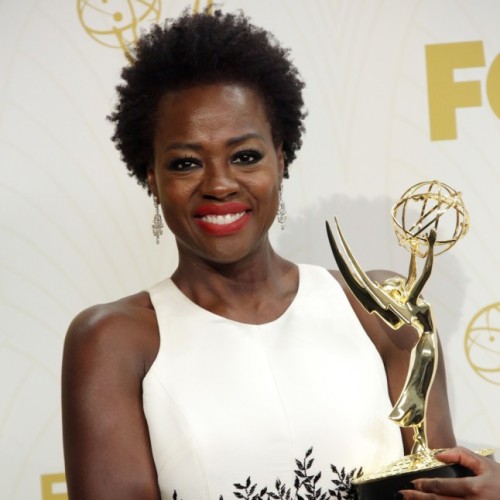
BLACK EXCELLENCE: Viola Davis is the first black woman to ever receive an Emmy award for Outstanding Lead Actress in a Drama.
While Viola Davis’ win at the Emmy’s can be viewed as another form of ‘black excellence’, the new wave of black firsts needs to be viewed with caution.
On Sunday night at the 68th annual Emmy awards, Viola Davis made history. She is the first black woman to win an Emmy for Outstanding Lead Actress in a Drama.
The new wave of ‘black firsts’ has gotten many sceptical of the co-option of black people into spaces they have historically not been allowed to enter. Areas that have rejected blackness and black
people have now miraculously ‘seen’ the light and are more accepting of individual blacks that have ‘made-it’. Think, Lupita N’yongo winning an Oscar, Spike Lee being offered an ‘honorary’ Oscar for Do The Right Thing more than 25 years after its release. Closer to home think Bonang Matheba being the first black South African woman to grace the cover of Glamour magazine. Why is this the case? Why now? And is it progressive to celebrate these so called ‘victories’?
Considering the demographic of the members of the academy and after a history of alienation and marginalization, it is surprising (and in many ways not surprising) that Davis got the award. The executive committee of the academy has 16 members. 12 of the members are white males, 3 are white women and 1 member is a woman of Indian descent. The board of governors is also almost all white, with one or two members out of almost 50 people that are people of colour.
Davis’ award is important for a number of reasons for black women. Firstly because Davis represents a kind of blackness that has historically been unacceptable for Hollywood. Her physical appearance (dark skin, kinky hair, big lips etc.) is one that often attracts roles associated with subservience, powerlessness, stupidity and promiscuity. Such roles perpetuate slave-imagery associated with black women – ugly, available. Her role in How To Get Away with Murder, in many ways, debunks all of these stereotypes. Annalise Keating, Davis’ character in the series, is brave, witty, smart, sexy, beautiful and powerful. Her role puts forward a different kind of black female representation.
Secondly, in her speech, Davis highlights lack of opportunities as the biggest hindrance to success for black women in most and all industries, she says “The only thing that separates women of color from anyone else is opportunity. You cannot win an Emmy for roles that are simply not there.” While some, including me, would have loved to hear Davis speaking on the almost invisible role the academy and film industry renders to black people generally and women specifically, for many it was inspiring to see an extremely talented black woman getting due credit for her work.
But, it is also important to be weary of such wins. Pop culture and celebrity culture often appropriate discourse for their own selfish gains. The Emmy’s and the Oscars strategically choosing certain black folk to ‘award’. These appropriations water down hopes for true freedom for the marginalised. There is a growing disgruntlement among black people around the world. Now more than ever, inroads are being made into the master’s house. Slowly and patiently, the oppressed and marginalised all over the world are sketching the path to demolish (white) power. And when such victories are awarded to blacks, the aim is to silence. Why should blacks complain when they are being given awards? Why should we want liberation when women with natural hair are now cover girls and models? When America has a black President?
So when all the hype dies down, will Davis’ win change anything for black women in the industry? For black women in America and the world? Probably not.
